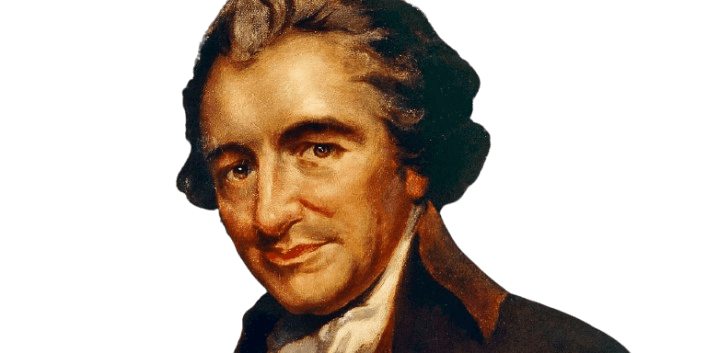Life and achievements
Early life
Thomas Paine spent his early years in Thetford, Norfolk, England, while his parents practised different faiths as a Quaker and an Anglican. His early life taught him about religious acceptance while showing him the hardships of the standard working class. His education was basic because he learned mathematics and writing, but his learning stopped when he was young. Before moving on to his tax officer position, he learned the corset-making trade from his father and then held several jobs.
His job as a tax collector revealed how the British government mistreated its people. His active work to improve excise officer work conditions led to his dismissal. His experiences with oppression during his early life developed his political beliefs, ultimately motivating him to move to America in 1774. Benjamin Franklin supported his immigration to Philadelphia, and he immediately joined revolutionary political activities in the city.
America became the defining moment of his existence during his residence there. Only two years after his arrival, he wrote Common Sense, a historical turning point. Through his talent for explaining political concepts in terms understandable to everyone, he developed into a forceful advocate for independence. He devoted his life afterward to fighting for liberty across the world and in America.
Legacy
Thomas Paine established a lasting impact through his work in political theory, revolutionary efforts, and advocacy for human rights. Through his writing, Paine activated the American independence movement, the French democratic revolution, and other revolutionary movements worldwide. Through his political activism, he advocated for radical changes that involved removing royalty and social programs.
Paine's writings made an enduring impact on how America developed its democratic system. Through his advocacy of self-governance, Paine helped create the foundational principles of America, and his analysis of institutional power continues to have significance in modern times. His advocacy for universal suffrage, progressive taxation, and social security programs established essential principles of contemporary governance, which he introduced before others.
His later social rejection failed to diminish the impact of his work, which continued to motivate others. During the 19th and 20th centuries, reformers, labor movements, and civil rights leaders used his written works as their foundation. Two famous figures, Abraham Lincoln and Thomas Edison, publicly acknowledged his valuable work. Modern liberal democracy relies on the fundamental ideas that he established.
Scholars, together with activists, have performed a restoration of his reputation during the past few years. Societies' educational programs and statues now pay tribute to his essential work. His concept of democratic governance that serves the people's interests functions as a leading principle in current movements fighting for liberty and justice worldwide. History has proven correct the ideas of this little-known figure who passed away unnoticed.
Milestone moments
Jan 6, 1776
Publication of Common Sense
Paine released Common Sense, which called for American independence through his pamphlet.
Hundreds of thousands of book copies sold out immediately after its publication.
His direct, forceful statements found agreement among people from all walks of life and those fighting for revolution.
The pamphlet inspired authors to produce the Declaration of Independence, which appeared that same year.
Dec 6, 1776
The American Crisis
Paine produced The American Crisis during the Revolutionary War to motivate American soldiers.
His well-known statement, "These are the times that try men's souls," helped lift soldiers' spirits.
George Washington instructed his troops to hear his written document when they crossed the Delaware River.
The pamphlet helped sustain public backing for the revolutionary movement through its distribution.
Mar 6, 1791
Rights of Man
In Rights of Man, Paine presented his defense of the French Revolution by attacking the institution of monarchy.
British authorities considered the book hazardous because many readers consumed it.
He escaped to France after being charged with sedition because the nation received him as a celebrated figure.
Through his democratic advocacy, he motivated reform movements to emerge throughout Europe.
Jul 6, 1793
The Age of Reason
In his work, The Age of Reason, Paine launched an attack against organized religion.
In this work, he supported Deism while advocating rational thinking instead of religious faith.
This book generated intense controversy because people accused Paine of being an atheist, and it provoked massive opposition.
The ideas expressed in this work inspired secular and humanist movements that emerged after its publication.
